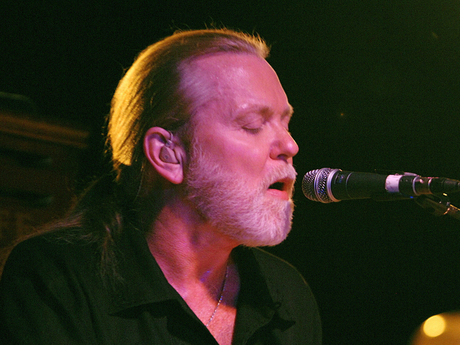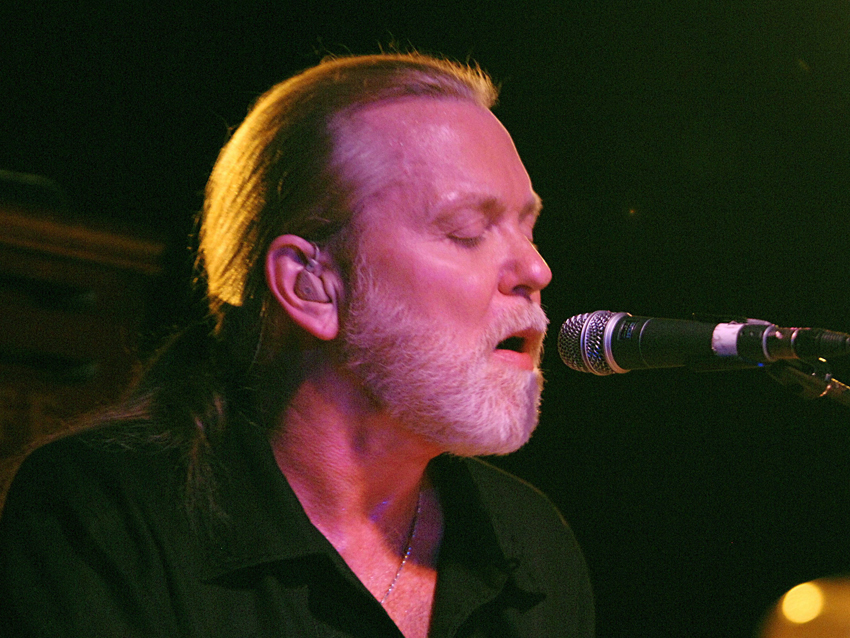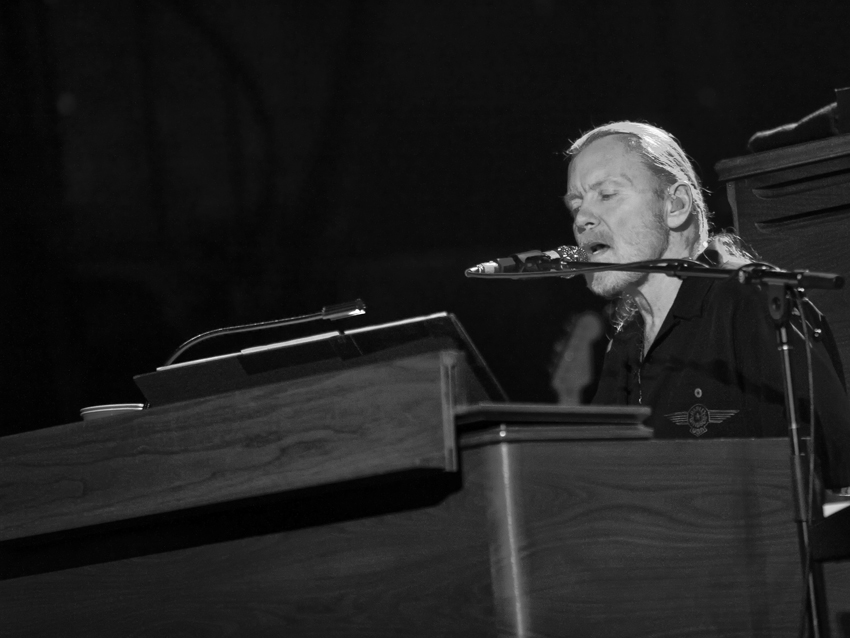

Gregg Allman, with the help of producer T Bone Burnett, awakens musical spirits on Low Country Blues. © Larry Marano /Retna Ltd./Corbis
On Low Country Blues, Gregg Allman connects with the music and souls that defined his sound - and, by extension, helped form the foundation of The Allman Brothers Band - with such passion and reverence that listening to it is almost like curling up with somebody else's diary. BB King, Otis Rush, Muddy Waters, Skip James - these aren't mere influences; to Allman, they're family members. He knows their secrets in ways we never could, but on this ameliorating journey he tells their tales...and his own.
Produced by T Bone Burnett, a man whose roots are steeped in the same swamp water and moonshine as Allman's, Low Country Blues, is a spooky and spiritual all-covers affair with the exception of Just Another Rider, an Allman-Warren Haynes collaboration that sounds neither forced nor incongruous. Backed by an impeccable assortment of players, from legends like Dr John to the rising hotshot Doyle Bramhall II, it's a stone-cold triumph by a man who looked death right in the face (Allman received a liver transplant last year) and lived to fight another day.
Funnily enough, Allman, who cut his last solo record in 1997, wasn't sure he had another one in him - or the will to try. The death of his longtime friend and producer Tom Dowd in 2002 shook him to the core. "That was a huge thing," Allman says. "When Tom died, I didn't want to even hear about making albums and stuff. 'Recording? What's that?' I just didn't wanna know. I was disillusioned about the whole idea of breaking in another producer. All of a sudden, there's a new guy in the band - you know how that can be. But T Bone had the right stuff. He knew where I was comin' from. He got me thinking that a new record wouldn't be such a bad idea."
Judging from the album's top five debut last week, Allman's fans couldn't agree more. "Man, that blew me away, seeing it come in like that," the singer says with a chuckle. "You hope for it, but you never expect it. Needless to say, it's very gratifying. This is a record I feel very special about, so to see people accepting it, that's pretty nice."
MusicRadar spoke with Gregg Allman recently about the recording of Low Country Blues, his admiration for T Bone Burnett, his love of vintage Hammond B-3s, the state of his health and what's on the horizon for The Allman Brothers Band.
I understand that one of the main reasons you went with T Bone Burnett as a producer was because of the respect he had for Tom Dowd, who produced many of the classic Allman Brothers records.
Get the MusicRadar Newsletter
Want all the hottest music and gear news, reviews, deals, features and more, direct to your inbox? Sign up here.
"That's right. T Bone brought him up right away - said he patterned a lot of his stuff after Tom and all that. I wasn't prepared for that. Yeah, he had lot of great things to say about Tom, and I could tell it was genuine. That got me thinking, 'OK, there might be something to this guy. I should hang with him and see what his approach might be.'"
Let me ask you about Tom Dowd. What did he bring to your early records that was so special?
"Tom was a beautiful guy and a dear friend. He had a great way about him in the studio. The reason we kept going back to him and working with him was because we knew it was going to be a fun and easy experience. No yelling, no fighting - not that there weren't occasional problems; you always get a little of that. But a lot of producers act like Attila The Hun when you're making a record; they have this 'my way or the highway' thing, which is totally unnecessary, in my opinion.
"Now, you can pull the plug on a producer any time if you want, unless they're intertwined in your record contract in some way, and then you're screwed. Tom always went to great lengths to make us all comfortable in the studio. He made sure everything was clear, that everybody knew what we were doing and why. There was no guessing with him. We always felt safe with Tom. He was like part of the band. He was a total gentleman. Not many guys like him."
Did you experience a similar feeling working with T Bone?
"That's a fact. T Bone pushed me, but in a good way. He was very cool and understanding. He's got your back, you know what I mean? Good guy."
He sent you a bunch of songs to consider for this record and asked you to pick out your favorites.
"Yep. He sent me 25 songs and asked me to pick 15 I'd like to work on. I sat with those for about five to seven weeks. I did this while I was waiting around for a new liver."
The songs you recorded are pretty iconic. Were there any tracks T Bone sent you that you considered sacrosanct? Like, "I can't bring anything new to this. I shouldn't touch this one"?
[laughs] "There might have been a couple, but I ended up doing them anyway. Like the song Blind Man, I don't know what you can do to that song. Maybe you can change the horn parts around. The intro chords…you can do them a little different. I think that's about all we changed on that one."
I was going to mention Blind Man as being one of my favorites. The way you cut it, the horns make the song sound like big band blues.
[laughs] "Yeah! That's what I shot for. I've always been into big bands. In fact, if I can, in a couple years, maybe I'll do a big band thing. But you know, that's a pretty expensive proposition."
OK, so Blind Man worked out well. Still, did any of the songs present problems?
"Well, now that you mention it, Rolling Stone did. The biggest thing that threw me in that song is that it doesn't change chords. I always heard chord changes in that tune, and I kept going to them and I thought, 'Ah…this is getting really redundant.' [laughs] So we left it for a while, then we came back to it, and bam! we knocked it out pretty quickly. I think I was overthinking the tune too much. That can happen."
Overall, your vocals have a very live feel. In fact, I can even hear the room sound. I take it you didn't do a lot of overdubs and punching in parts.
"No, sir, not at all. They're all live takes. They're all first takes, in fact. That right there scared me."

Rockin' the B-3 with The Allman Brothers Band in Boston, 2010. © Tim Bugbee ./Retna Ltd./Corbis
Which surprises me, because you don't seem like the kind of guy who would want to sit and fuss over things. I would imagine that the idea of first takes would appeal to you.
"Yep, you'd think so. But I'm also a perfectionist. [laughs] Yeah, I love spontaneity - that's what jammin' is all about. But this band didn't jam that much, so what would happen was, we'd put a pilot vocal down - you know, a guide vocal - and that would just be for everybody to hear what it would kind of sound like before we did it for real. Before we started, though, T Bone would always say, 'Sing it like you mean it.' Which I always thought I did. So we'd do a pass, and I'd say, 'OK, T Bone, I think you can push that little red button now.' And he'd say, 'I already did. Come on in and and listen.'
"So I'd go in and sit down him, and I'd say, 'Yeah, that's good, but c'mon now, we're just learning the damn thing. I know I can make it better.' I was just being a stubborn ass, you know what I mean? And he'd laugh and say, 'Well, go ahead and try, but I'm keeping this one.' Sure enough, I'd go back out, sing the song, then I'd sit down with T Bone and listen again. And wouldn't you know it? The first pass that T Bone liked was always the best one. [laughs] I could never improve on what we did first time up at bat. And he knew it, too!" [laughs]
You have a lot of incredible musicians on this album. I want to ask you about Doyle Bramhall II - what was it like working with him?
"Man, Doyle is great. He plays backwards, upside down, you name it. [laughs] The first time you see a lefty play, it's startling. I just sat and watched Doyle in amazement. I would ask him, 'How do you go about learning a new chord? Do you hang upside down and look at it like that?' And he just said, 'No man, you just kind of look at it like you're looking in a mirror, and you figure it out.' But he's one fine player. I really enjoyed working with him."
One of the other great players, of course, is the legendary Dr John. You guys have quite a history. What was it like playing with him again?
"It was wonderful, 'cause neither one of us was in a fog. It was great seeing each other and knowing we were both clean and sober. It was such a gas, man. [laughs] We laughed and laughed! We talked about old times… 'Hey man, remember when we almost got busted?' [laughs] I tell you, it's nice to be able to sit back and know we got through it all."
Obviously, you're known primarily as a keyboardist, but you do play the guitar, and you play a fair amount on the new record.
"That's right. I'm a lefty, too, but that's the only thing in life I do right-handed. Isn't that strange?" [laughs]
Well, I guess it's jut the way you learned to play. How do you rate yourself as a guitarist?
"Oh, I'm average. [laughs] That's about it. Nothing more, nothing less."
What kinds of guitars did you play on this album?
"I played a 1934 J-200 Gibson. I really like that one. It gets a real nice sound, it's easy to play…That's about all I can ask for, really."
Instrumentally, you're best known for your use of the Hammond B-3 organ. What models do you tend to favor?
"Well, Hammond closed down in the early '70s, but if you ask me, you can't beat a 1969 B-3. They were the absolute best. I think the folks at the company might have known they were gonna fold, so the ones made in '71 and '72 kind of went downhill. No, a '69 has the right sound. I use that through a 122 RV Leslie speaker, with nothing beefed - the rest of it is absolutely stock."
There's one original tune on the album, Just Another Rider, which you wrote with Warren Haynes. How did that come about?
[laughs] "Haynes had it started. We'd been working on it for about eight or nine months. Then I did a benefit for Michael J Fox, and I asked Warren to come down and meet up with me - he lives near the Hudson River, which is pretty close to New York City. So he came over to my hotel room, and we finished the damn song up. This was about two month before I met T Bone.
"We had a couple of other ones, Warren and me, but that's the only one I showed T Bone. I wasn't real sure about springing it on him, but halfway through the sessions, he goes, 'You got anything in that writing bag of yours?' So I said, 'Well, yeah, I got this one.' I didn't know if it'd fit, but I guess it did. Of course, the only problem with writing a song is you gotta learn it. But the band we had was real good, so it wasn't a problem. I think we got that thing nailed in two passes. Or maybe one pass and eight questions." [laughs]
You mentioned your liver transplant earlier. How is your health these days? How are you feeling?
"I feel pretty good. It's just…the healing process from all of this takes...it's long, man. It's hard stuff. And one thing that happens with liver transplants is, you're prone to getting hernias. I've got three of 'em. And they can't operate on them for a year. Other than that, I'm doing OK."
In March, The Allman Brothers Band begin their annual run of shows at the Beacon Theatre in New York. Last year, you guys were displaced by Cirque du Soleil and had to play at another venue. Did that feel weird?
"Yes, it did. At first, it felt pretty strange. But the audiences were great, so they made us feel at home again. We're pretty fortunate in that respect - wherever we play, the crowd welcomes us. You can't beat that. I'm really looking forward to these shows. Being back at the Beacon Theater will feel really good."
Joe is a freelance journalist who has, over the past few decades, interviewed hundreds of guitarists for Guitar World, Guitar Player, MusicRadar and Classic Rock. He is also a former editor of Guitar World, contributing writer for Guitar Aficionado and VP of A&R for Island Records. He’s an enthusiastic guitarist, but he’s nowhere near the likes of the people he interviews. Surprisingly, his skills are more suited to the drums. If you need a drummer for your Beatles tribute band, look him up.
"Reggae is more freeform than the blues. But more important, reggae is for everyone": Bob Marley and the Wailers' Catch a Fire, track-by-track
“Part of a beautiful American tradition”: A music theory expert explains the country roots of Beyoncé’s Texas Hold ‘Em, and why it also owes a debt to the blues










